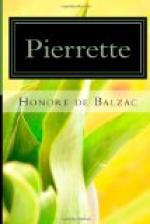On this, the colonel and lawyer took the field. They got a hundred shares, of five hundred francs each, taken among the farmers and others called independents, and also among those who had bought lands of the national domains,—whose fears they worked upon. They even extended their operations throughout the department and along its borders. Each shareholder of course subscribed to the paper. The judicial advertisements were divided between the “Bee-hive” and the “Courrier.” The first issue of the latter contained a pompous eulogy on Rogron. He was presented to the community as the Laffitte of Provins. The public mind having thus received an impetus in this new direction, it was manifest, of course, that the coming elections would be contested. Madame Tiphaine, whose highest hope was to take her husband to Paris as deputy, was in despair. After reading an article in the new paper aimed at her and at Julliard junior, she remarked: “Unfortunately for me, I forgot that there is always a scoundrel close to a dupe, and that fools are magnets to clever men of the fox breed.”
As soon as the “Courrier” was fairly launched on a radius of fifty miles, Vinet bought a new coat and decent boots, waistcoats, and trousers. He set up the gray slouch hat sacred to liberals, and showed his linen. His wife took a servant, and appeared in public dressed as the wife of a prominent man should be; her caps were pretty. Vinet proved grateful—out of policy. He and his friend Cournant, the liberal notary and the rival of the ministerial notary Auffray, became the close advisers of the Rogrons, to whom they were able to do a couple of signal services. The leases granted by old Rogron to their father in 1815, when matters were at a low ebb, were about to expire. Horticulture and vegetable gardening had developed enormously in the neighborhood of Provins. The lawyer and notary set to work to enable the Rogrons to increase their rentals. Vinet won two lawsuits against two districts on a question of planting trees, which involved five hundred poplars. The proceeds of the poplars, added to the savings of the brother and sister, who for the last three years had laid by six thousand a year at high interest, was wisely invested in the purchase of improved lands. Vinet also undertook and carried out the ejectment of certain peasants to whom the elder Rogron had lent money on their farms, and who had strained every nerve to pay off the debt, but in vain. The cost of the Rogrons’ fine house was thus in a measure recouped. Their landed property, lying around Provins and chosen by their father with the sagacious eye of an innkeeper, was divided into small holdings, the largest of which did not exceed five acres, and rented to safe tenants, men who owned other parcels of land, that were ample security for their leases. These investments brought in, by 1826, five thousand francs a year. Taxes were charged to the tenants, and there were no buildings needing insurance or repairs.




